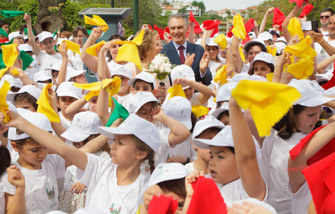
Madam Mayor of Vila de Rei,
Madam Secretary of State for Culture,
Dear Family of José Cardoso Pires,
Ladies and Gentlemen,
In October 1925, this County witnessed the birth of José Cardoso Pires.
In October 1998, Portugal witnessed, with sadness, the passing away of this great author.
Ten years later, we meet in Vila de Rei, to pay the tribute that is owed by all lands to their offspring.
Since José Cardoso Pires left it, the County of Vila de Rei suffered many changes, and I had the privilege to witness such changes.
The naturals of Vila de Rei have certainly queried themselves during many years: how is it possible to be in the centre of Portugal and, at the same time, far away from what is going on?
In those days, Vila de Rei, in spite of its central situation, was not a crossroads to anywhere.
Few people came here. This was an unusual and unfair isolation that reached those precisely in the middle of the nation’s territory.
Nobody escapes reality: little could be achieved without firstly shattering the isolation.
Years past, the county of Vila de Rei is better served by means of communication. I recall the milestone that was the opening of the new bridge over the river Zêzere, in March 1995, to which I was a party as Prime Minister. Isolation had been finally done away with.
For this reason, much is possible nowadays. But the much that is possible continues difficult as the inhabitants of Vila de Rei well know, and particularly, their indefatigable Mayor.
The interior of the Country is, as always, far from investments and employment. The interior is uninhabited as it never was.
Vila de Rei well knows the meaning of the desertification of rural areas and the deterioration of the regional unbalances.
It is my conviction that the Country, as a whole, must assume the responsibility of investing in a more humane and harmonious development. Territorial cohesion and the defence of our identity demand a growing regard from the powers that be towards the grievous issue of the depopulation of the interior.
But Vila de Rei knows it cannot wait. And is well aware of what it can accomplish.
Public wisdom tells us that virtue is midway. It is important that virtue becomes more attractive. The virtues of Vila de Rei must be brought out. So that the fresh breezes, the pure waters and the welcoming people become better known and call on the many Portuguese who are not yet aware of the beauty of these lands.
Local culture also attracts outsiders. But culture is, above all, a means of development of the potential of every human being. For this reason, access to culture is one of the more important rights of man.
Talking about culture in Vila de Rei is a remission to the older and livelier traditions of the people of this land.
But talking about culture here, particularly at this time, is also to talk about José Cardoso Pires, one of the greatest Portuguese novelists of the 20th century, whose work emerged equally in the theatre and in the cinema, and has been translated into several languages.
A chronicler of social and human issues, rigorous in the use of the word and the image, courageous and truthful in the ideas he brought forward, José Cardoso Pires carried out, in his work, systematic and deep thoughts about Portugal and the Portuguese.
Each book, he said, “is a search of my identity with the Country and with my own self”.
José Cardoso Pires had a difficult relationship with the Country and with his origins, possibly because he took a serious view of that relationship. As it should be. There, in the unique terrain of identity and authenticity, criticism is as important as the love for what is criticized.
We, the Portuguese, well know what we represent.
José Cardoso Pires battled, throughout his life, with the lack of freedom and with the search for the sense of newly found freedom.
In his final days he even faced the supreme quandary of a communicator: the impossibility of communicating.
Temporarily recovered, he moved the Portuguese with a story of a different José. From a Cardoso Pires that, for the first time, could not find the words to convey his thoughts.
This capability had never been missing. He had even written, ages ago, about posthumous tributes. Tributes which he feared could become an abusive appropriation of a life, such as his, which had always refused obeisance and subservience.
This is not the case with this tribute. The José Cardoso Pires whom we recall today was a great writer and Portuguese in all respects, in his non submission, in his contradictions, in his sharp intellect with which he wanted to destroy myths, in his sensitivity capable of, as he was wont to say, “to get down to the bone”. It was his own way to deeply love Portugal and the Portuguese.
The Vila de Rei Municipal Library demonstrates the investment of the local authority in culture as a prime source of development. This will house, from now on, a large portion of the literary heritage bequeathed by the family of José Cardoso Pires. The spirit of a great Portuguese author will forever be celebrated here.
© 2006-2016 Presidency of the Portuguese Republic
You have gained access to the records of the Official Site of the Presidency of the Republic from 9 March 2006 to 9 March 2016.
The contents available here were entered in the site during the 10 year period covering the two mandates of President of the Republic Aníbal Cavaco Silva.